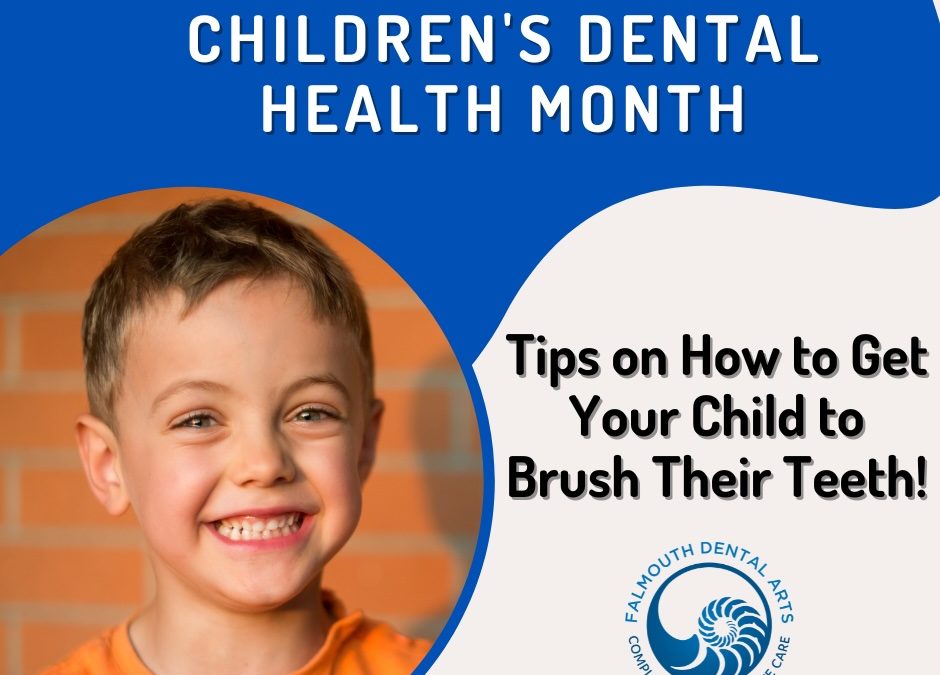
Feb 1, 2025
We made it to February and to National Children’s Dental Health Month! This month-long observance is all about helping kids develop good oral health habits, something we are passionate about at FDA. What’s at the center of every oral care routine? Brushing! Here are 3 tips from our team to get your kids to brush twice a day, every day!
Kids love to have fun! Why not bring some fun to brushing time! There are lots of silly songs that will get your kids smiling as they brush. Playing a song that your child can brush along with can also help them brush for the full two minutes…a big win! Another fun trick – have your kid wear sunglasses while they brush – everyone looks cool in sunglasses! Also, there are tons of toothbrushes featuring fun colors and your kids’ favorite cartoon characters that can help get your kids excited, too. Find what makes it silly and fun for your family!
Use your imagination and find some creative ways to inspire your kids to brush. Perhaps brushing is a game of zapping all the “bad guys,” aka cavity-causing bacteria, in their mouths. Or maybe your child is a crocodile with a lot of teeth to brush! There are so many creative ways to engage your kids at brushing time! Plus, when they have a positive association with their oral brush, you’re building healthy habits for life!
As parents, you are your kids’ best teacher and example. Next time they have to brush their teeth, do it alongside them! They will watch you and learn from the master! Showing your kids how you brush and floss each day will surely inspire them!
Whenever you have questions or concerns about your children’s oral health, please don’t hesitate to call us at 207.781.5900! Our team of hygienists love to educate kids and help them set up their oral health care routines! We’re your partner in oral health and in keeping your kids smiling!
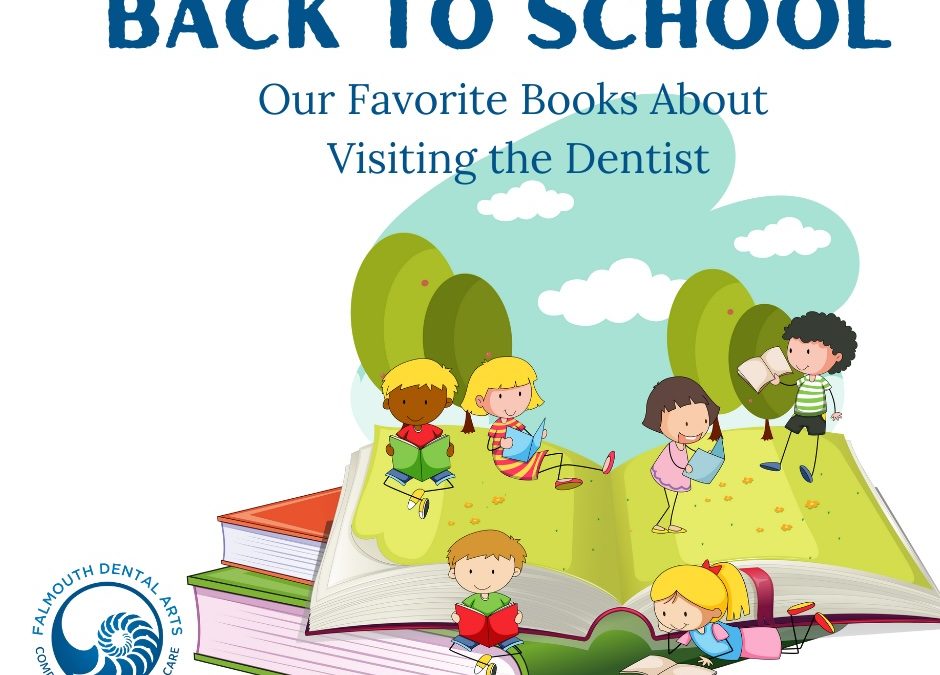
Sep 4, 2024
You can feel it in the air – September has arrived! That means it is back to school time! As you get your child ready for another year of learning and growing, it’s a great time to make sure they have their next check-up with Dr. Brunacini or Dr. Karagiorgos scheduled. At Falmouth Dental Arts, we believe good dental habits start early and we love helping our youngest patients learn more about their oral health. Books are a great way to prepare your kids for what they can expect during a dental appointment and encourage healthy habits. In the spirit of the back to school season, we put together a list of some of our favorite books about visiting the dentist!
Tooth by Leslie Patricelli
It’s an exciting time when your baby gets their first tooth! Your kids will love this colorful and fun board book that will introduce your child to the wonderful world of teeth and how to keep them healthy!
The Berenstain Bears Visit the Dentist by Stan and Jan Berenstain
This book is a classic! Your kids can tag along as the whole Bear Family goes to the dentist to get their teeth cleaned and learn about oral health care. It’s also a great introduction to the tooth fairy!
The Tooth Book by Dr. Suess
Another classic to add to your bookshelves! When it comes to writing that is silly and clever, nobody beats Dr. Suess, and this book teaches kids all about why it’s important to take care of their teeth.
Sesame Street: Ready, Set, Brush
Even monsters need to brush their teeth! This pop-up book features all your favorite Sesame Street monsters as they learn how to brush their teeth and visit the dentist.
The Night Before the Dentist by Natasha Wing
This rhyming story follows a boy on his journey to the dentist for a check up. Filled with helpful details so your child will know what to expect, this is a great book for kids who feel a little nervous about coming in for an appointment.
The list could go on and on…there are so many great books for kids that will help them feel more comfortable about coming in for check ups with Dr. Brunacini and Dr. Karagiorgos and more confident about taking good care of their teeth at home. Reading books together is a great way to talk about the importance of good oral health habits! What are your favorite books about visiting the dentist? Let us know on our Facebook page! If you have questions or need to schedule your child’s next dental appointment, please call us at 207.781.5900. We love helping our patients smile!
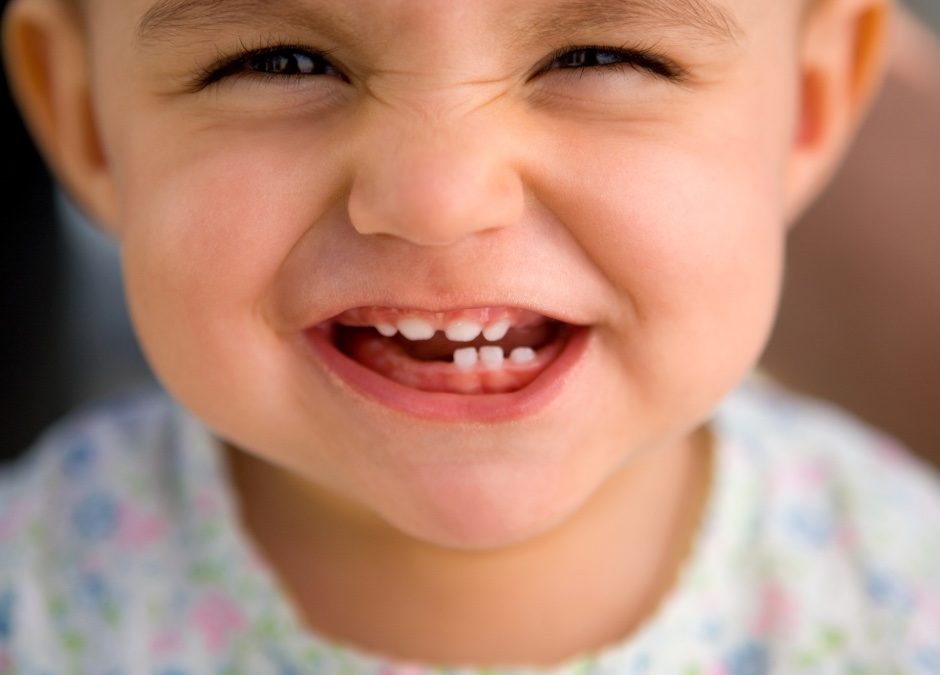
Feb 1, 2023
At FDA, we believe that healthy habits start early! In honor of Children’s Dental Month, we’re talking about your child’s baby teeth: what to expect, and how to care for them. Here are some frequently asked questions:
1) How Important are Baby Teeth?
Although they are eventually replaced by adult teeth, baby teeth are still very important! Not just cute, they actually help with chewing solid food, learning to talk, and they serve as placeholders for when the big teeth grow in.
2) When Will My Baby Develop Baby Teeth?
Children develop at different rates, but typically a baby will sprout his or her first tooth between 6 to 12 months of age. Usually, the two bottom front teeth pop up first, with the top two teeth following right behind. New baby teeth continue to make their appearance until about age three. Around age six, you can expect your child to get their first loose tooth!
Your baby or toddler may have lots of space between their teeth and that’s ok! This is normal and allows more space for adult teeth when it is their time to move in. For more information on new teeth timing, check out the American Dental Association’s Eruption Chart.
3) When Should My Child Start Brushing and Flossing?
Even though all baby teeth will eventually fall out, tooth decay and cavities are still possible, even at a young age. To clean your baby’s first tooth, use a wet washcloth to gently wipe the tooth and the front of the tongue. Do this after feeding your baby and again before bed.
When your baby has more than one tooth, you can start brushing them with a soft-bristled, baby toothbrush or you can use your finger. Use an ADA-approved toothpaste specifically formulated for babies or just plain water works too! Flossing isn’t necessary until two or more teeth are touching together, usually between the ages of two and three.
4) When Should My Child First Visit the Dentist?
Every child is different and we want to help them build a positive relationship with oral health and dental care. We recommend scheduling your child’s first dentist appointment between their first and their third birthday. Give us a call to determine if your child is ready for their first appointment. At this appointment, Dr. Brunacini or Dr. Karagiorgos will help them to feel comfortable with the dental chair and all of the tools we use. We will examine your child’s teeth for cavities and will also give you and your child a lesson on proper brushing technique.
If you have any questions or concerns about your child’s little pearly whites, feel free to get in touch – we’re here to help! Our team of fun and friendly dental professionals looks forward to caring for your child and helping them develop life-long healthy habits! Give us a call at 207.781.5900!

Oct 11, 2022
Happy Healthy Halloween from FDA!
Here at FDA, we are all about teaching healthy oral care habits right from the start, but we also want the kiddos to have lots of FUN on one of the most popular holidays of the year – Halloween! All the little trick-or-treaters out there can go ahead and enjoy their Halloween treats without causing major damage to their pearly whites! Here’s how…
1. Count Your Candy
Let your child know how many pieces of candy he or she can eat in one sitting. After they have finished their candy quota for the day, put it away. Adults should follow this rule too (no more sneaking your favorite candy into the closet)!
2. Save Some for a Rainy Day
Decide how many days you and your child can enjoy snacking on the Halloween candy stash and then save some for later by storing it in the freezer. You can also reduce your supply by donating leftover candy to an organization that sends care packages overseas to active military members to lift their spirits.
3. Choose Tooth-Friendly Treats
Candy that is easy to chew and swallow is always better for the teeth than sticky and chewy choices that tend to linger on the teeth. Chocolate bars and crunchy or easily-dissolvable candy are preferable over taffy, caramel, and sticky choices.
4. Brush ASAP
Encourage your child to floss and brush right after eating Halloween candy, especially if it was something sticky or chewy that could get stuck on or in between the teeth. The sooner your child brushes his or her teeth, the better, to minimize any damage to the enamel of the teeth. This is even more important if your child eats candy late in the evening, as sleeping with sugar on the teeth can increase his or her risk of getting a cavity. Following up toothbrushing with a fluoride rinse is also a good idea.
5. Rinse with Water
Drinking water after eating or drinking anything sugary is always a great cavity preventative. Drinking water after meals is a healthy habit that helps rinse your mouth of bacteria and neutralize the acidity in the mouth caused by foods to help prevent tooth decay and cavities.
6. Schedule a Checkup
Now that the kids are busy back at school and with extracurricular activities, it’s easy to forget to schedule your child’s regular hygiene appointments. Give us a call at 207.781.5900 if you have any questions about your child’s oral health, or would like to schedule an appointment – we’re here to help!
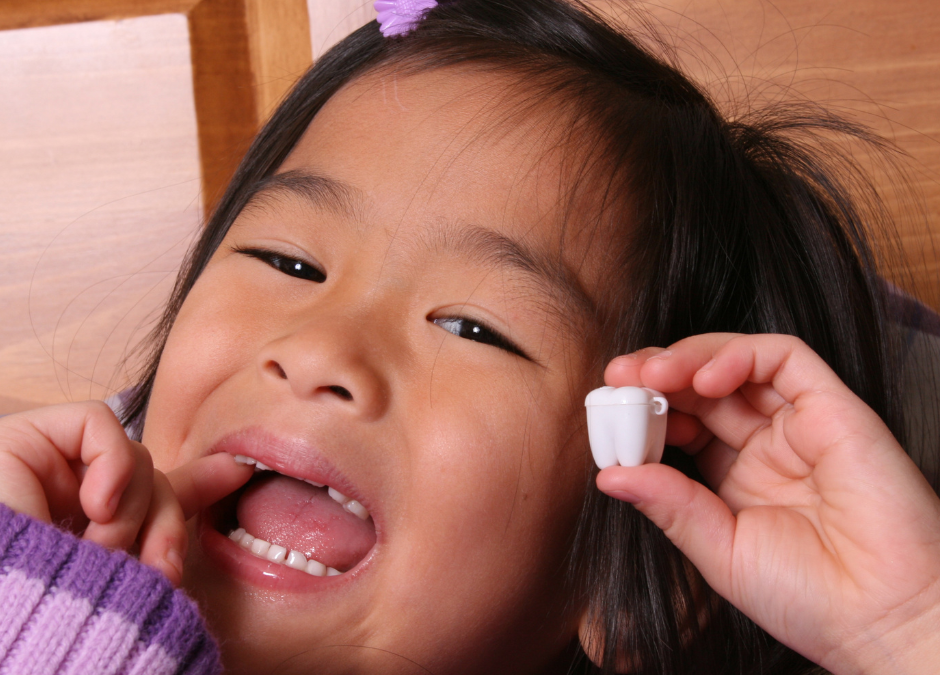
Sep 21, 2022
At Falmouth Dental Arts, we believe that good oral health habits start early. We love helping children learn to take care of their teeth and it’s always an exciting time when a little one has his or her first loose tooth! Your child may have questions about having a wiggly tooth and may be wondering what to do if he or she loses it at school. Here are six tips that will make having a loose tooth a fun and stress-free experience!
1) Be Prepared
Most children have their first loose tooth between the ages of 6-7, although some may lose a tooth earlier and some later. It is very likely that once your child reaches kindergarten age, he or she will find themselves heading to school with a loose tooth. Prepare your child for this possibility by telling them that it’s okay – this is a completely normal and exciting milestone! This handy tooth chart, created by the American Dental Association, will help give you (and your child) an idea of what to expect and when!
2) Tell Your Child’s School
It’s a good idea to let your child’s teacher know if your child has an extremely wiggly tooth, especially if he or she is feeling nervous about it. Elementary-level teachers have lots of experience with their students losing teeth at school and can refer your child to the nurse to rinse their mouth or get cleaned up if the tooth does come out. Let your child know he or she can bring the tooth home in a plastic baggie or wrapped in a tissue to put under their pillow for the Tooth Fairy’s visit later on.
3) To Pull or Not to Pull – Let Your Child Take the Lead
You may be wondering if you should pull out your child’s loose tooth at home or let it fall out on its own. The answer is…let your child decide! If the tooth is really wiggly or is causing them discomfort, your child may just want to get it over with and ask for your help. If they do, place a tissue over the tooth and gently squeeze. If it’s ready, it should just come right out. Tell him or her how brave they were and how the Tooth Fairy recognizes extra courage!
4) Keep Calm and Continue Your Child’s Dental Routine
Tell your child that they should not touch or prod the space where their tooth used to be. The area should heal up quickly, although he or she may want to eat on the other side of their mouth if the gum area is still feeling sensitive. Your child should continue their regular dental routine – brushing twice a day and flossing daily – as usual and should rinse or brush gently around the area to make sure it stays clean and no food gets stuck.
5) Bring on the Tooth Fairy!
If you’re open to a little make-believe, a visit from the Tooth Fairy can become a really special tradition for your child. Check out our past post about fun Tooth Fairy traditions from around the world. Encourage your child to write a note to the tooth fairy, letting her know that he or she lost her tooth at school or that they asked you to pull it out at home. Have them leave the note under their pillow, or on their door so the tooth fairy doesn’t forget to visit (wink, wink). Consult other parent friends to determine “the going rate” for a gift from the Tooth Fairy, or set your own rate and explain that every child has his or her own special fairy that’s just right for them.
6) Get in Touch with Us if You Have Questions!
If your child seems to be very early or late in losing a baby tooth or loses a tooth due to injury, do not hesitate to give us a call at 207.781.5900. Our team of compassionate dental professionals would be happy to answer any questions you may have or can schedule an exam for your child with Dr. Brunacini or Dr. Karagiorgos. While your child is here for his or her appointment, we can also go over their dental routine to make sure they are taking care of their baby teeth as well as the new permanent teeth growing in!
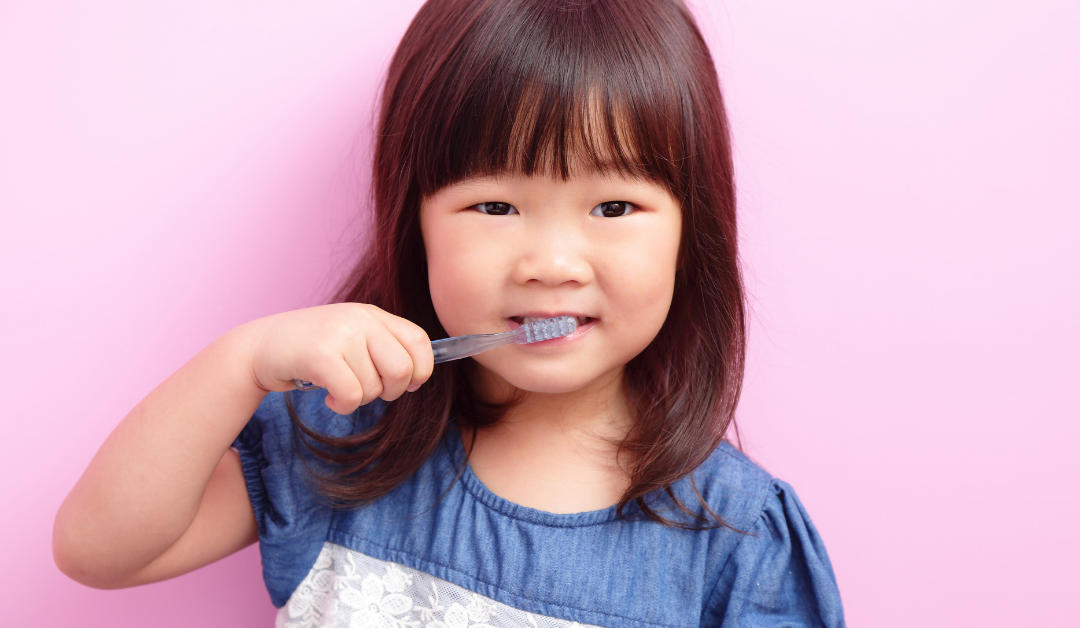
Feb 4, 2022
February is National Children’s Dental Health Month, which makes now the perfect time to review how to care for your little or big kids’ teeth at home. This month-long awareness campaign was created by the American Dental Association to bring together dental professionals to promote the benefits of children’s oral health. Here at Falmouth Dental Arts, we believe that children should be actively involved with caring for their own teeth. Good oral habits start early and it’s important to create positive memories for your little ones about their dental experience. Our compassionate team of dental professionals is always happy to spend time educating both parents and children on good dental health habits such as scheduling check-ups and creating a daily flossing and brushing routine. Read on for a few of our favorite tips!
Tips for Babies and Toddlers
- At the first sign of a new tooth, use an infant toothbrush with a pea-sized amount of toothpaste and gently brush those mini pearly whites. Look for toothpaste that is approved by the American Dental Association for use with babies – if you need product recommendations, let us know!
- When your baby has two teeth side-by-side (usually the bottom center two teeth), you can begin flossing between them.
- Schedule your babies’ first dental check-up by 12 months of age. You can expect that during the first visit we will introduce your child to our office, the dental chair, and any tools and products that we will be using during a routine cleaning appointment. We start by simply taking a look into your child’s mouth to get them accustomed to this routine while we assess their teeth and gums. Our warm and friendly professional team is skilled at taking each step at a pace that is comfortable for your child. Your child’s first visit may also include a fluoride treatment, depending on his or her age, needs, and readiness.
Tips for Big Kids
- Continue to supervise your child’s brushing habits up to age 8 as they may not always brush long enough and may need to be reminded not to swallow the toothpaste. Replace his or her toothbrush every 3-4 months with a theme or color of their choosing. Reinforce that they should be brushing twice a day, for two minutes each time.
- Teach your child or teen about the importance of both hydration and good nutrition. Explain why healthy snacks like fruits and veggies as well as calcium-rich foods like yogurt and cheese are good for growing teeth and bones.
- Make sure your big kid flosses and swishes with a fluoride rinse once per day.
- Schedule your child’s dental appointments two times per year or more, if recommended. Dr. Brunacini and Dr. Karagiorgos love seeing the next generation of smiles coming through the office doors and helping them to establish healthy dental habits early on!
If you have any questions at all about your child’s dental health or need to schedule an appointment, give us a call at 207.781.5900.






